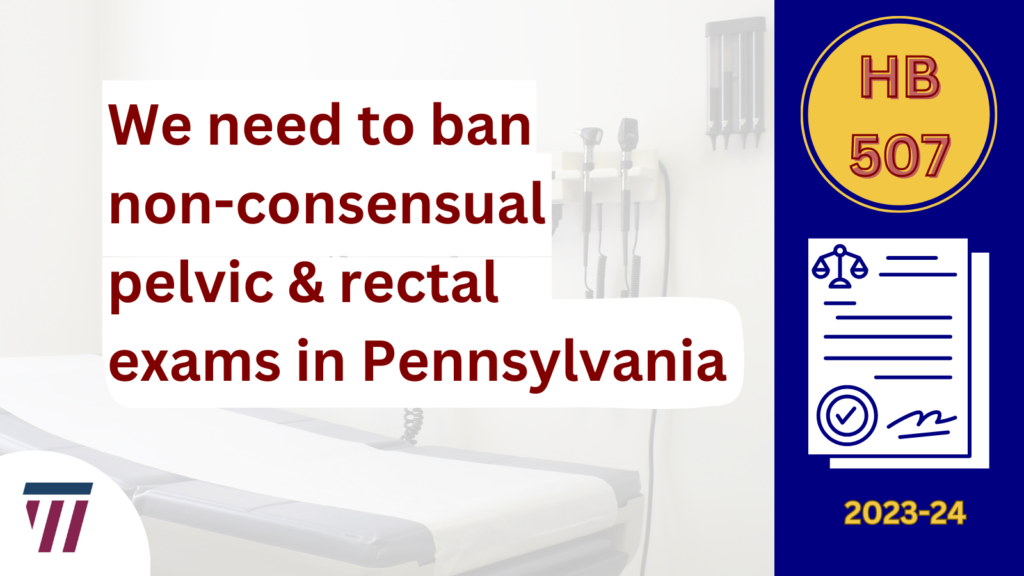
Pennsylvania House Bill 507 was introduced by Rep. Elizabeth Fielder (D-Philadelphia) and Rep. Liz Hanbidge (D-Montgomery) in March 2023. This legislation would prohibit the practice of nonconsensual pelvic, prostate, and rectal exams conducted on patients under anesthesia or unconscious, which is occurring in hospitals across Pennsylvania.
You can check the status of House Bill 507 here.
Women’s Law Project strongly supports Pennsylvania House Bill 507.
Nonconsensual pelvic, prostate, and rectal exams are deeply rooted in racism and sexism, violate a patient’s right to bodily autonomy, disproportionately affect women generally and Black women in particular, and harm medical students as well as patients.
HB 507 prohibits health care providers or students from performing pelvic, prostate, or rectal exams on unconscious or anesthetized patients without first obtaining specific informed consent verbally and in written form, except during medical emergencies. This legislation was introduced in response to recent reports of medical providers subjecting patients to these types of exams without their consent or knowledge.
This practice is now illegal in a growing number of states including California, Hawaii, Illinois, Iowa, Maryland, Oregon, Utah, and Virginia.
Passing HB 507 into law in Pennsylvania would:
Protect Patient Rights: This bill will ensure that all patients have control over what happens to their body while they are under anesthesia and protect patients’ dignity by guaranteeing they will be asked for explicit consent before any invasive pelvic, rectal, or prostate exam is conducted while they are under anesthesia.
Eliminate a Racist & Sexist Medical Practice: The history of gynecology is rooted in the exploitation and abuse of Black women’s bodies; the practice of nonconsensual pelvic exams is rooted in slavery. Today, Black people are more likely to use teaching hospitals and are therefore more likely to be subjected to nonconsensual pelvic, rectal, and prostate exams, representing a continuation of medical racism.
Empower Medical Students: Medical students have reported feeling pressured to obey their authority figure’s directions despite personal reluctance to “practice” on people under anesthesia without explicit consent. This bill empowers medical students to refuse to violate their personal ethics and patients’ rights and bodily autonomy.
Background: Scope of the Problem
Several surveys indicate invasive exams on patients under anesthesia without explicit consent is a longstanding and widespread practice. A 2005 survey found a large majority of medical students had performed pelvic exams on patients under anesthesia; the patients had not explicitly consented in nearly three-quarters of these cases. In a 2003 survey of 400 medical students from five medical schools in Philadelphia, 90% of respondents admitted to having performed a pelvic exam on an anesthetized woman, although it was not clear how many of the women had consented to the exam.
Medical Education Would Not Suffer if Nonconsensual Pelvic & Rectal Exams Are Banned
Research shows that the majority of women, if asked, would consent to allow a pelvic exam for medical education purposes while under anesthesia.
Many institutions have already banned the practice in favor of hiring “gynecological teaching associates” who are trained in educating the student in best examination practices. Research shows that in addition to preserving patient and student integrity, this approach results in greater competence and better communication skills than other methods.
Medical Experts Oppose Nonconsensual Pelvic & Rectal Exams
The American College of Obstetricians and Gynecologists (ACOG) opposes pelvic exams without explicit consent. In 2011, ACOG issued a statement asserting “pelvic examinations on an anesthetized woman that offer her no personal benefit and are performed solely for teaching purposes should be performed only with her specific informed consent obtained before her surgery.”
The American Medical Association, the Joint Committee on the Accreditation of Hospitals, and the Association of American Medical Colleges have also issued statements condemning the practice of nonconsensual pelvic and rectal exams on patients under anesthesia.
Medical Students Oppose Being Forced to Conduct Nonconsensual Pelvic & Rectal Exams
Medical students and former medical students have been speaking out in opposition to performing invasive pelvic and rectal exams on patients under anesthesia without explicit consent and report feeling pressured to obey superiors within a hierarchal training system. A survey conducted at the University of Pittsburgh School of Medicine indicated the majority of students supported obtaining explicit consent for such exams.[11]
You can download a PDF of this fact sheet here.
If you support this legislation, please contact your Pennsylvania Representative and Senator and urge them to support SB 507 then share this information with your networks and urge them to do the same.
For more information, contact us at tmurtha@womenslawproject.org.


